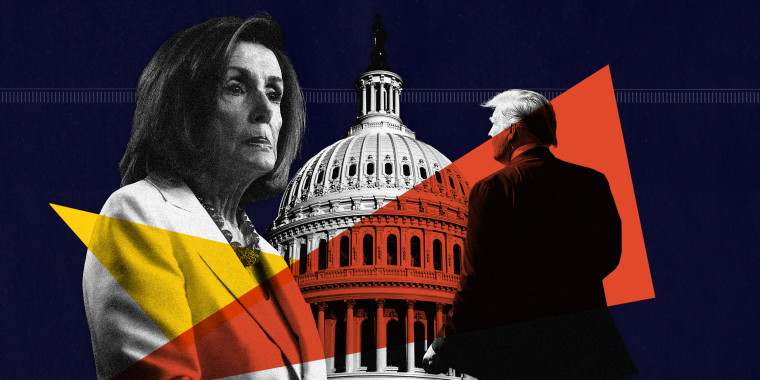President Donald Trump is facing allegations that he tried to strong-arm a foreign leader into launching an investigation that might hurt Democratic contender Joe Biden. In response, House Speaker Nancy Pelosi on Tuesday for the first time endorsed impeachment proceedings.
She joins a slew of swing district Democrats who'd previously stayed away from the subject. A formal impeachment inquiry — the third in modern history — now looms. And, especially if Democrats end up rolling this inquiry into a formal impeachment vote, so do questions about the political fallout. Here are four of the biggest:
1. What will voters think?
So far, impeachment has not been popular among voters in polling, but the context of the discussion has been the Mueller investigation. Now, something different is at issue — the president's conduct with Ukraine.
This raises the possibility that public opinion will shift. The immediate place to look is among Democrats. A recent Monmouth University poll found that 25 percent of them didn't think Trump should be impeached, compared to only 2 percent of Republicans who said he should.
With Pelosi now leading a more concerted Democratic impeachment drive, the question is whether previously reluctant Democratic voters follow along. If they do, overall polling on the question of impeachment will grow tighter than it's been.
There's also the question of whether the Ukraine story will resonate outside of the Democratic base. Will independent voters (who opposed impeachment 60-34 percent in the Monmouth poll) shift in a significant way? Will there be any kind of movement among Republicans?
The less unpopular impeachment becomes, obviously, the less risk Democrats will face of stirring a backlash. And if the Ukraine story were to evolve in a way that created majority support for impeachment, they could end up on solid political ground.
2. The potential danger for Dems
Trump is not a particularly popular president.
His approval rating is generally in the high 30s to the mid-40s; it's never broken 50 percent in the Real Clear Politics average. His disapproval number is often over 50 percent. This is why the public's aversion to impeachment — so far — has been striking.
In Monmouth’s poll, for example, 57 percent of voters said that Trump shouldn't be re-elected in 2020 and that it's time for someone else to be president. And yet, only 35 percent said they wanted to see him impeached and removed from office now. It's possible this reflects a sense among some voters that impeachment would represent overreach, and that the question of Trump's fate should be adjudicated by the public in November 2020 — and not by Congress before then.
This is a variable that was not in play during the last two impeachment drives, with Bill Clinton and Richard Nixon. Both of them were in their second terms, free from facing the voters again. If polling on impeachment does not budge after this week's developments, it will raise the possibility that voters feel strongly that the final decision on Trump should be theirs.
Democrats, if they still went ahead with impeachment, would be ignoring this at their own peril.
3. The Romney factor
Impeachment in the House requires only a simple majority, something Democrats could attain without a single Republican vote. But conviction in the Republican-controlled Senate would require a two-thirds supermajority — meaning Democrats would need a lot of GOP help to get there.
This is where the Clinton impeachment fell apart in 1998. Republicans had the votes in the House, but Democrats closed ranks around the president and prevented a conviction in the Senate.
A key reason Democrats stayed in line: Sen. Joe Lieberman of Connecticut, then a widely respected voice on morality in public life. Lieberman was a Clinton ally and when Clinton admitted that he'd lied about an affair with Monica Lewinsky, Democrats looked to Lieberman for guidance.
There was speculation that he would demand the president's resignation, but when he went to the Senate floor on Sept. 3, 1998, he stopped short of that, decrying Clinton's conduct but refusing to back his removal from office. Lieberman's decision provided cover to other Democrats, and Clinton never faced a stampede of defections.
If there's a Republican who might play the Lieberman role now, it could be Sen. Mitt Romney of Utah, who has so far gone further than other Republicans in expressing concern over the Ukraine story.
Whether Romney would ever endorse Trump's impeachment is unclear. It's also unclear if such a move from him — or from any other individual Republican — would set off a cascade of GOP impeachment calls. Republicans in Washington believe Trump has a strong grip on their party's base and have demonstrated repeatedly that they view crossing him as akin to crossing their own voters.
4. What if nothing changes?
Impeachments are rare in history and are supposed to be seismic political events. Trump impeachment hearings, to say nothing of a full-fledged Senate trial, will attract massive public attention and dominate the landscape for months. And yet, it seems at least possible that no minds will end up being changed.
After all, the Trump presidency has been defined by swirling controversy and chaos. But for all of the tumult, his job approval rating has been remarkably stable. In many ways, it would be in keeping with the intense polarization of this era if a monthslong impeachment saga produced party-line votes in the House and Senate and a president who is neither weakened nor strengthened by the exercise.

